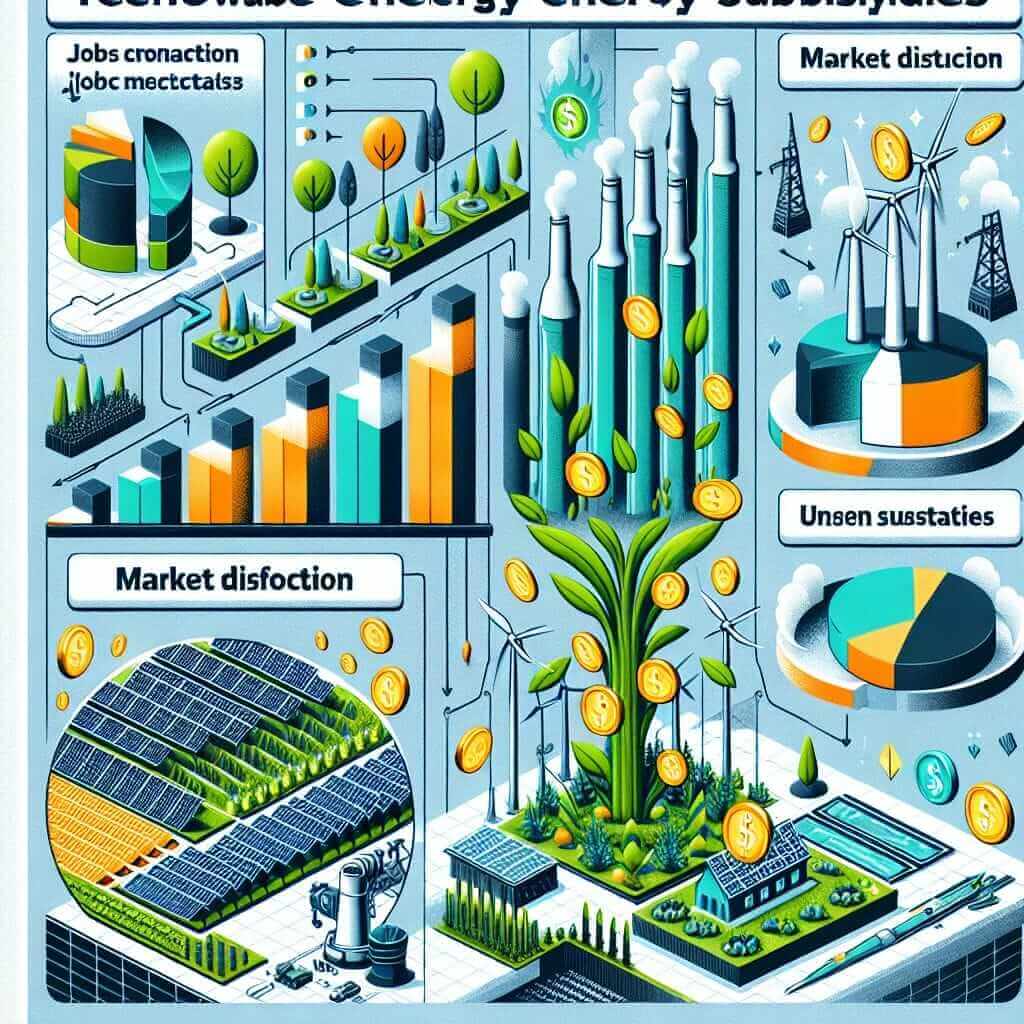The IELTS Reading test is an essential component of the IELTS exam, assessing your ability to read and understand a variety of English texts. Among the frequently covered topics in the IELTS Reading section, the economic effects of renewable energy subsidies are gaining attention due to their relevance in today’s global energy discourse. This article delves into this topic, offering a detailed reading practice test that simulates the real IELTS experience, along with comprehensive analyses for better understanding and preparation.
Practice IELTS Reading Test on Economic Effects of Renewable Energy Subsidies
Reading Passage:
Economic Effects of Renewable Energy Subsidies
Renewable energy subsidies are financial aids provided by the government to support the development of clean energy sources such as wind, solar, and hydroelectric power. These subsidies aim to reduce the dependence on fossil fuels, mitigate environmental issues, and boost economic growth. However, the economic impacts of renewable energy subsidies are complex and multifaceted.
Subsidies lower the cost of production for renewable energy, making it more competitive against traditional energy sources. This often leads to increased investment in the renewable sector, creating jobs and stimulating technological advancements. For instance, countries like Germany have seen significant growth in their renewable energy industries due to substantial subsidies.
Despite these benefits, critics argue that renewable energy subsidies can distort market dynamics. Subsidies may lead to an over-reliance on government support, potentially discouraging private sector innovation. Additionally, the financial burden on taxpayers and the allocation of funds from other crucial sectors are contentious issues.
The long-term economic benefits of renewable energy subsidies are evident in terms of energy security and environmental sustainability. Reduced dependence on imported fossil fuels enhances national security and shields economies from volatile global oil prices. Moreover, the reduction in greenhouse gas emissions fosters a healthier environment, which translates into savings on healthcare costs and improved quality of life.
In conclusion, while renewable energy subsidies present economic advantages such as job creation and technological innovation, policymakers must consider the potential downsides, including market distortions and budgetary constraints. Balancing these factors is key to maximizing the economic benefits of renewable energy subsidies.

Questions:
Question Type: True/False/Not Given
- Renewable energy subsidies only benefit solar power industries.
- Subsidies can make renewable energy sources more cost-competitive.
- Critics believe subsidies always lead to market improvements.
- Reduced greenhouse gas emissions can decrease healthcare costs.
Question Type: Multiple Choice
-
What is one major advantage of renewable energy subsidies?
- A. Increased reliance on fossil fuels
- B. Job creation and technological advancements
- C. Higher energy costs for consumers
- D. Decreased investment in renewable energy
-
Which country was mentioned as having benefited significantly from renewable energy subsidies?
- A. Japan
- B. Canada
- C. Germany
- D. Australia
Question Type: Summary Completion
Complete the summary using words from the passage.
Renewable energy subsidies are government __ (7) provided to support the development of clean energy sources. These subsidies help lower the __ (8) of production for renewable energy, leading to increased __ (9) and job creation. However, critics argue that they might cause market __ (10) and place a financial burden on taxpayers.
Answers and Explanation:
True/False/Not Given
- False – The passage mentions that subsidies benefit various renewable energy sources, not just solar power.
- True – The text states that subsidies lower the cost of production, thus making renewable energy more competitive.
- False – Critics argue that subsidies can distort market dynamics, which is a negative effect.
- True – The passage explains that reduced greenhouse gas emissions lead to health-related savings.
Multiple Choice
5. B – One major advantage highlighted is job creation and technological advancements.
6. C – The passage specifically mentions Germany as having benefited from renewable energy subsidies.
Summary Completion
7. aids
8. cost
9. investment
10. distortions
Common Mistakes to Avoid
- Misinterpreting the Question: Ensure you understand exactly what the question asks. In this practice test, the questions are designed to test your comprehension of specific details, implied meanings, and the overall gist of the text.
- Overlooking Key Details: Pay attention to every part of the passage. Details about countries benefiting from subsidies or specific economic effects can be crucial.
- Incomplete Summary Completion: When completing summaries, use the exact words from the passage unless instructed otherwise.
Vocabulary Highlight
- Subsidy (noun) [ˈsʌbsɪdi]: Financial support provided by the government to help a business or sector.
- Mitigate (verb) [ˈmɪtɪɡeɪt]: To make less severe, serious, or painful.
- Over-reliance (noun) [ˌoʊvər ɪˈlaɪəns]: Excessive dependence on something.
- Volatile (adjective) [ˈvɒlətaɪl]: Liable to change rapidly and unpredictably, especially for the worse.
Grammatical Structures
- Comparative Constructions: “Subsidies help lower the cost of production, making it more competitive…”
- Complex Sentences: “While renewable energy subsidies present economic advantages such as job creation…, policymakers must consider the potential downsides…”
Tips for High Reading Scores in IELTS
- Practice Regularly: Regular reading practice, especially on a variety of topics, helps improve speed and comprehension.
- Understand Different Question Types: Familiarize yourself with different question types in the IELTS Reading test.
- Build Vocabulary: Expand your vocabulary to better understand various texts.
- Develop Skimming and Scanning Skills: These skills are crucial for identifying key information quickly.
- Time Management: Practice under timed conditions to get used to the pressure of the actual exam.
By continuously practicing these strategies and engaging with well-structured practice tests like the one above, you’ll be well-prepared for the Reading component of your IELTS exam.
For more in-depth articles on related topics, check out The Impact of Renewable Energy Incentives on Industry Growth and The Role of Government Policy in Promoting Renewable Energy.